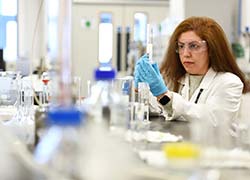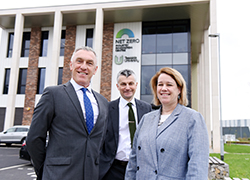Teesside boosts international reputation for forensic excellence
A Teesside University academic is helping to put the University at the forefront of crime scene and forensic science research and discussion after having work published in a prestigious international journal.
Brian Rankin, from the School of Science & Engineering, contributed four pages in the accreditation chapter in the ‘Encyclopaedia of Forensic Sciences’ – the second edition international publication, released in 2013. The accreditation chapter demonstrates the international industry standard at which forensic science practice needs to be delivered to the justice system. Brian and Teesside University were integral to the Quality Assurance Agency for Higher Education (QAA) subject benchmark statement for forensic science which was produced in December 2012.
Brian, Head of the Centre for Forensic Investigation at Teesside University, chaired the working group that produced the benchmark, which shapes how forensic science is taught in educational establishments all over the country and sets the overall UK standard in the field. Brian said: ‘As chair of the QAA board responsible for creating the benchmark statement, my job was to facilitate all the contributors and drive it forward as a leader. It’s a great honour to be in a position to shape how forensic science is taught in this country and to be a big part of such major discussion, once again emphasising the University’s academic calibre. I feel this will be a real legacy for forensic science.
‘I sit on a number of national committees, so the many contacts I’ve made have been aware of Teesside’s reputation for a while. Being approached by the Encyclopaedia and QAA to make telling contributions as a representative of the University has been fantastic.’
In a busy year, Brian, along with Dr Tim Thompson, Reader in Biological and Forensic Anthropology and Gillian Taylor, Senior Lecturer in Forensic and Analytical Science, also released a paper in September 2012 entitled ‘should higher education respond to recent changes in the forensic science marketplace?’.
This trio of publications and contributions has helped Teesside University make significant strides within the crime scene and forensic science industry.
Brian added: ‘It’s incredible to be a part of growing Teesside University’s reputation for high quality academic output, contributing to both industry and education standard. From a personal perspective, I’m proud to be helping to shape how forensic science should be taught and delivered.’
Barry Coppinger, Cleveland’s Police and Crime Commissioner, commented on the force’s relationship with Teesside University at April’s National Forensics Conference, held in Teesside University’s Stephenson building.
He said: ‘The development over 10 years of some first-class facilities at Teesside University such as the most comprehensive crime scene house laboratory in the UK, means students – and ultimately Cleveland Police, amongst others - receive some of the best training and development opportunities in the country.
‘I’ve visited our Cleveland Forensics service and also seen the University’s excellent facilities and its confirmed my belief the real CSI ‘stars’ are without doubt here on Teesside.’
 Supporting Nigerian farmers by transforming food waste into
...
Supporting Nigerian farmers by transforming food waste into
... International partnership signed with prestigious American
...
International partnership signed with prestigious American
... Teesside University academics join prestigious network of
...
Teesside University academics join prestigious network of
...